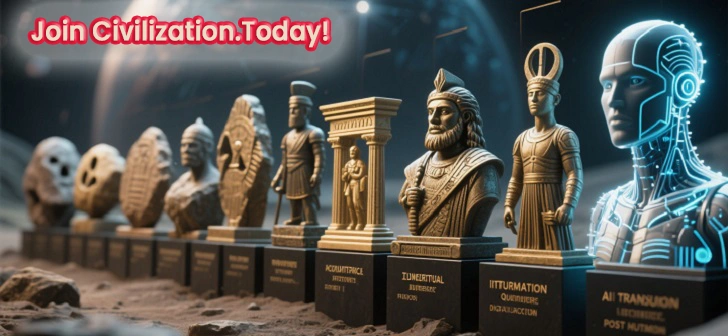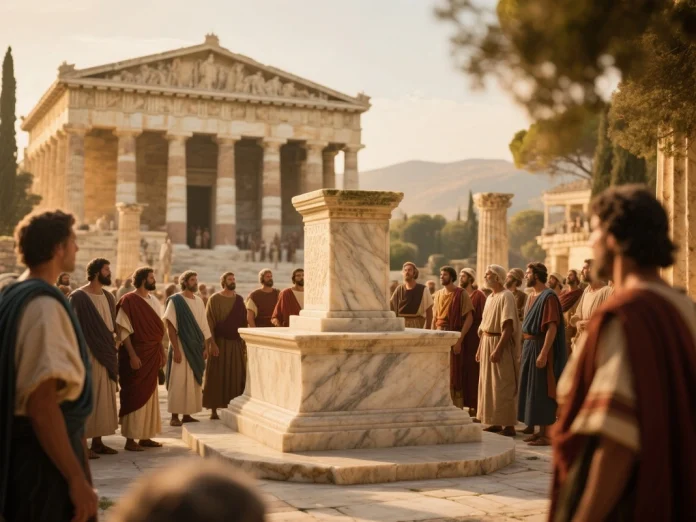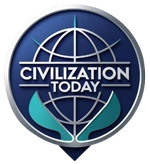When we think about freedom, elections, and citizens shaping their own destiny, our minds often travel back to a single place: ancient Athens. The birth of democracy there wasn’t just a political shift; it was a revolutionary moment in human history that forever altered the way societies viewed power and governance. But how exactly did this experiment begin, and why did it matter so much?
In this article, we’ll dive deep into the turbulent streets of Athens over 2,500 years ago, explore the courageous reforms that sparked the world’s first democratic system, and understand how the democracy born became the foundation of the modern world.
Before Democracy: Athens Under Tyranny
To truly appreciate the birth of democracy, we need to imagine Athens before its emergence. Like many other Greek city-states, Athens was initially ruled by kings, then aristocrats, and later by powerful tyrants. These rulers controlled wealth, land, and laws—leaving ordinary citizens with little say in the decisions that shaped their lives.
The system was deeply unfair. A small elite dictated policies while the majority—farmers, soldiers, craftsmen—remained voiceless. Social tensions grew, and the stage was set for radical change.
Solon’s First Steps Toward Freedom
The seeds of democracy were first planted by Solon, an Athenian statesman in the early 6th century BCE. Solon recognized the growing discontent and introduced reforms to ease social tensions:
- He canceled crushing debts that enslaved citizens.
- He reorganized society based on wealth rather than birth.
- He gave ordinary Athenians a limited role in the political process.
Though his reforms fell short of full democracy, they marked the beginning of a shift—an acknowledgment that power should be more widely shared. Solon cracked the door open, but others would push it wide.
Cleisthenes: The Father of Athenian Democracy
The true birth of democracy came in 508 BCE with Cleisthenes, often called the “Father of Democracy.” Facing political chaos and rival factions, Cleisthenes did something radical: he handed power to the people.
His reforms included:
- Breaking Aristocratic Power. He reorganized Athens into ten tribes, blending people from different regions to weaken elite dominance.
- The Council of 500. A new governing body selected by lot, ensuring broader participation and reducing corruption.
- Ostracism. A unique system where citizens could vote to exile any individual seen as a threat to democracy.
For the first time in history, ordinary citizens—not kings, not tyrants, not aristocrats—held real political power. This was the true democracy was born.
How Athenian Democracy Worked
Athenian democracy wasn’t just symbolic; it was participatory and direct. Unlike modern representative democracies, citizens voted on laws themselves. Every free male citizen over 18 could attend the Assembly, debate, and vote.
Some key features included:
- Direct Participation. Citizens voted on issues directly rather than electing officials to decide for them.
- Selection by Lot. Many public offices were filled randomly to prevent corruption.
- Accountability. Officials could be removed or punished if they abused power.
Of course, Athenian democracy wasn’t perfect. Women, slaves, and foreigners were excluded from political rights. But within its limits, it was a radical departure from every system that came before.
The Impact of Athenian Democracy
The newly born of democracy in Athens rippled across history in powerful ways. It reshaped political thought, inspired philosophers like Socrates, Plato, and Aristotle, and planted seeds that would eventually grow into the systems we know today.
When the Founding Fathers of the United States drafted their Constitution, they studied Athenian democracy. When revolutionary movements in Europe demanded liberty, they invoked the Athenian model. In fact, nearly every modern democracy owes something to this ancient experiment.
Lessons from the Birth of Democracy
The Athenian experiment teaches us several timeless lessons:
- Freedom Requires Courage. Democracy was born because ordinary Athenians dared to challenge tyrants.
- Participation Matters. The strength of democracy lies in active citizen involvement.
- No System is Perfect. Even the Athenian model excluded large groups of people, reminding us that democracy must constantly evolve.
- Ideas Outlast Empires. Though Athens eventually fell to stronger powers, its democratic ideals survived for millennia.
Why the Birth of Democracy Still Matters Today
In an age where democracy faces challenges worldwide, the story of Athens reminds us of the fragility and importance of freedom. The birth of democracy wasn’t inevitable—it was fought for, debated, and defended. And that struggle continues.
Every time citizens vote, protest, or demand accountability, they echo the voices of ancient Athenians who first claimed the right to govern themselves.
Conclusion
The democracy that was born in Athens was more than a political reform—it was a revolution in human thought. It showed that power could come from the people, that laws could be debated openly, and that freedom could be a shared reality rather than a privilege of the few.
While imperfect, Athens’ bold experiment laid the groundwork for the democratic systems we know today. And as long as freedom matters, the story of Athens will remain one of history’s greatest legacies.



